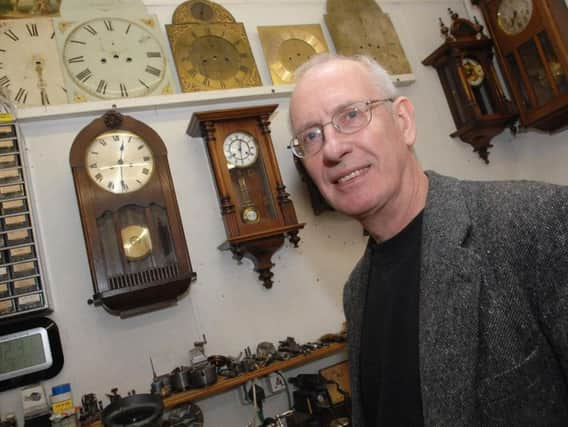'These clocks will last for centuries, but people like us will not,' retiring Knaresborough clock-maker warns of national skill decline


Philip Oliver has worked as a clock maker for almost 30 years, trading from his shop space on Finkle Street since 1987. Now aged 66 he remains busy with back orders and customers travel from as-far-as London and Edinburgh for his services.Aiming to finish his remaining orders by autumn of this year he will then dismantle his workshop. While looking forward to his golden years he remains concerned at how time will treat the trade after he is gone.Mr Oliver said: “Some of these clocks I made myself, while some are hundreds of years old.“There is a problem country wide as clockmakers with these skills are just getting older, people with specialized trades like dial painting or clock hand cutting and everything like that are retiring.“These will leave a big void as less people take it up, with young people wanting to hit computer keys instead. This is a craft that has you working with your hands and that takes a long time to learn and do properly.“These clocks will last for centuries, but people like us will not.”Starting out as an apprentice cabinet maker Mr Oliver moved into clock making with his business partner, David Bailes, who first started the business under his own name in 1961 selling oak and mahogany furniture.The clock side of the business grew over time, eventually offering services including crafting long-case, regulator and bracket clocks alongside restorations of cases, dials and movements of antique clocks when Mr Oliver took it over in 1999.However today fewer people are following in his footsteps, a concern shared by the British Watch and Clockmakers Guild - the national professional body for horologists.While courses are available across the country, at sites such as West Dean College, Birmingham City College and Mancheser College, the numbers of graduates from these is estimated to be as low as 20.Chairman of the guild, Chris Papworth, highlighted that low numbers of apprentices do also continue to be taken on, but the guild is becoming increasingly concerned as more veterans of the craft retire or pass away with no one to replace them.Although today the trade has shifted to the maintaining of antique clocks Mr Papworth emphasised the need to maintain levels of trained individuals.Mr Papworth said: “It is no longer a job opportunity that many young people will consider. But we need to replace members of the trade who we are bleeding through retirement. “We are concerned at the number of people entering the trade and are always looking to hear from anyone who is interested in expanding their knowledge.“The fear we have now is that my generation are the last that was classically trained in the trade, if we fall off the perch or retire a lot of the tradition and skill will be lost.”To find out more about the British Watch and Clockmakers Guild or you can contact them on 07955192263 or visit www.bwcmg.org